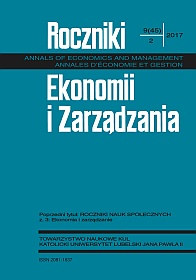The Organizational-Technological Aspects of knowledge Management in Modern Organizations in Period of Digital Transformation
Abstract
Solutions of the Information and Communication Technology (ICT) are the foundation of modern economic organizations in a knowledge economy. This is the case in particular in intelligent organizations, for which the advanced ICT infrastructure is the sine qua non condition for the effective knowledge management. This article is aimed at describing the role of modern ICT trends, which are described as SMAC (Social, Mobility, Analytics, Cloud), and are becoming an essential ICT element supporting management processes. Such solutions enable to create new models of organization operations on the global markets using strategic resources, such as the knowledge supported with SMAC solutions. The arguments are illustrated with results of own research conducted by the author in 2014-2016 in selected SME’s from the Mazowieckie and Wielkopolskie Provinces and their reference to the general development trends in this area.
References
Adamczewski P.: ICT Solutions in Intelligent Organizations as Challenges in a Knowledge Economy, „Management” (Zielona Góra) 20(2016), nr 2.
Adamczewski P., Kużdowicz P., Bartczak K.: Nowoczesne rozwiązania ICT w zarządzaniu wiedzą w organizacjach inteligentnych, Warszawa: Wydawnictwo Naukowe TEXTER 2016.
Barry D.K.: Web Services. Service-Oriented Architectures and Cloud Computing, New York: Morgan Kaufmann Publishers 2013.
Cisco Global Cloud Index 2013-2018, San Jose: Cisco Systems Inc. 2016.
Jashapara A.: Zarządzanie wiedzą. Zintegrowane podejście, Warszawa: PWE 2006.
Jemielniak D.: Zarządzanie wiedzą. Podstawowe pojęcia, w: Zarządzanie wiedzą, red. D. Jemielniak, A.K. Koźmiński, Warszawa: Wolters Kluwer 2012.
Marz N., Warren J.: Big Data, New York: Manningan Publications Co. 2015.
Mateos A., Rosenberg J.: Chmura obliczeniowa. Rozwiązania dla biznesu, Gliwice: Helion 2011.
Mikuła B.: Istota zarządzania wiedzą w organizacji, w: Komunikacja w procesach zarządzania wiedzą, red. A. Potocki, Kraków: Fundacja Uniwersytetu Ekonomicznego w Krakowie 2011.
Model biznesu. Nowe myślenie strategiczne, red. M. Duczkowska-Piasecka, Warszawa: Difin 2013.
Perera Ch., Ranjan R., Wang L., Khan S., Zomaya A.: Privacy of Big Data in the Internet of Things Era, „IEEE IT Professional Magazine”, PrePrint (Internet of Anything), Retrieved 1 February 2015.
Report IDC FutureScape „Worldwide IT Industry 2016 Predictions: Leading Digital Transformation to Scale”, New York 2016.
Schwaninger M.: Intelligent Organizations. Powerful Models for Systematic Management, Berlin Heidelberg: Springer-Verlag 2010.
Senge P.: Piąta dyscyplina, teoria i praktyka organizacji uczących się, Kraków: Oficyna Ekonomiczna 2002.
Strojny M.: Teoria i praktyka zarządzania wiedzą, „Ekonomika i Organizacja Przedsiębiorstwa” 2000, nr 10.
Strojny M.: Zarządzanie wiedzą w firmach konsultingowych, „Problemy Jakości” 2000, nr 3.
Systematic Management for Intelligent Organizations, red. S.N. Grösser, R. Zeier, Berlin− Heidelberg: Springer-Verlag 2012.
Waltz E.: Knowledge Management in the Intelligence Enterprise, Boston: Arteh House 2003.
Wiig K.M.: Knowledge Management. Where Did It Come From and Where Will It Go?, „Expert Systems with Apllications” 1997, nr 1.
Zarządzanie wiedzą w przedsiębiorstwie, red. K. Perechuda, Warszawa: PWN 2005.
Copyright (c) 2017 Roczniki Ekonomii i Zarządzania

This work is licensed under a Creative Commons Attribution-NonCommercial-NoDerivatives 4.0 International License.


